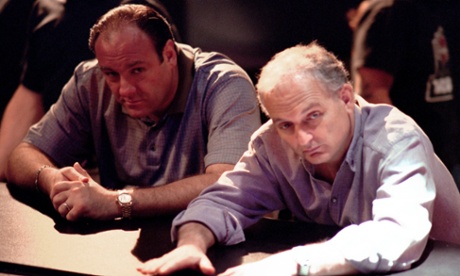In “College”, the fifth episode of The Sopranos, the double life of troubled mobster Tony Soprano comes into sharp focus. Tony has to perform two tasks – take his daughter Meadow to a college admissions interview and knock off fugitive informant Febby Petrulio – without letting his worlds collide.
Showrunner David Chase wanted Tony to garrotte Febby but HBO CEO, Chris Albrecht, blenched. Although HBO had been bold enough to pick up the show after every network had rejected it, Albrecht feared that viewers wouldn’t root for a protagonist who strangled a man in cold blood. That didn’t happen in 1999. Chase responded that if Tony didn’t do it, “he’s full of shit and therefore the show’s full of shit”. He got his way. Viewers loved it. RIP Febby. RIP received wisdom.
The Sopranos is such an acknowledged landmark in television history that the 20th-anniversary celebrations already feel exhausting. But when thinking about any cultural big bang, from the Beatles to Star Wars, it’s essential to crack the shell of overfamiliarity and remember a time when it was new, risky and had a fight on its hands. Chase’s argument with Albrecht was one such turning point.
To Chase and showrunning peers such as David Simon (The Wire) and David Milch (Deadwood), most TV drama, however well crafted, was full of shit, too restrained by moral simplicity and pat resolutions to tap the form’s full potential. The Sopranos generation gambled on viewers’ ability to handle far more complex and ambiguous narratives than the networks were giving them, demonstrating that television could equal, if not surpass, cinema and literature as a forum for audacious, multilayered storytelling. In the pilot episode, Tony Soprano says of the mafia: “Lately, I’m getting the feeling that I came in at the end. The best is over.” For television, the opposite was true.
As happened with the Beatles and Star Wars, The Sopranos’ innovations eventually froze into cliches. A few years after “College”, viewers had become so acclimatised to charismatic antiheroes that they would have been surprised if a protagonist didn’t make the worst choice. The Sopranos had no shortage of fine female characters – conflicted Carmela, monstrous Livia, poor Adriana – but the first wave of what became known as prestige TV was dominated by shows by and about “difficult men”, to quote the title of Brett Martin’s excellent book about the creative revolution: Mad Men, Breaking Bad, The Shield.
However, when you consider the most acclaimed recent shows, The Sopranos’ overt influence appears to be at a low ebb. Surly crimelords can be found in the likes of Narcos but they’re no longer front and centre. Killing Eve’s mesmerising sociopath is a young woman. Mrs Maisel has never watched the life drain from the eyes of a rival comedian, although that would certainly shake things up in season three.
The real legacy of The Sopranos is more subtle and diffuse. With all those memorable scenes of wiseguys getting whacked, it’s easy to forget how daringly strange the show could be: the cryptic dream sequences, the perversely long detours into the private lives of secondary characters, that infamous Schrodinger’s cat ending that epitomised Chase’s commitment to living with ambiguity. That experimental spirit can be detected in shows as diverse as Noah Hawley’s Fargo and Donald Glover’s Atlanta, which regularly scramble expectations in ways that, with the honourable exception of Twin Peaks, were inconceivable before The Sopranos. The fact that it feels natural to refer to Hawley and Glover (or Jill Soloway or Lena Dunham) as authors illustrates The Sopranos’ greatest achievement: convincing the television industry to wean itself off tried-and-tested formulas and trust maverick showrunners with peculiar ideas.
Twenty years on, prestige TV has attained overwhelming dimensions, empowering scores of creators who couldn’t have thrived in the rule-bound world of pre-Sopranos television. While the success of The Sopranos was made possible by the economics of cable channels, DVD binge viewing and episode-by-episode TV criticism, affluent streaming platforms such as Netflix have opened the floodgates. The vast amount of brilliant, idiosyncratic television that we now enjoy is due in no small part to David Chase’s refusal to be full of shit.











